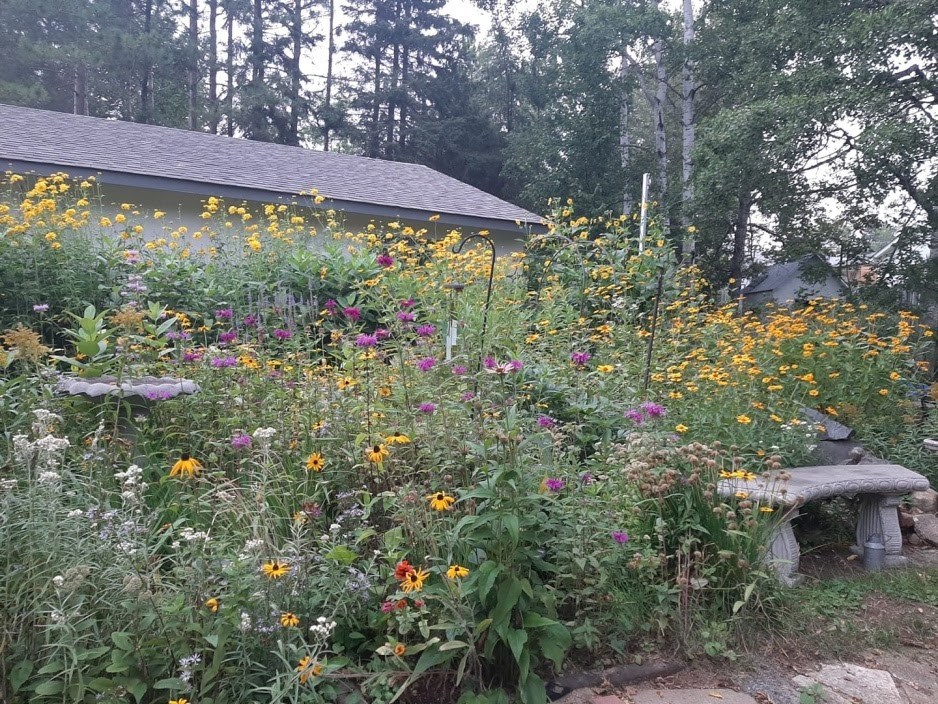THUNDER BAY – Thunder Bay residents would be empowered to naturalize their entire yards under proposed new yard and property standards put forward by the city.
A previous draft of the city's new yards bylaw had drawn criticism from advocates who said it didn’t go far enough to support residents who want to naturalize their yards, replacing turf grass with other ground cover.
At least one of those advocates said she’s satisfied with changes unveiled Monday by city staff following a round of public consultation.
“All the things I was hoping to see in our bylaw, I see now,” said Kyla Moore, whose presentation to council last year helped spark the rules review. “I think it’s something Thunder Bay can really be proud of.”
The rules will support alternatives to turf grass like native grasses and wildflowers, exempting naturalized areas from the 20-centimetre height limit for turf grass. A short list of invasive and problem species will be prohibited.
Restrictions staff had at first proposed, like limiting naturalization to 50 per cent of open yard space and requiring a buffer strip of mowed lawn, which had been criticized as arbitrary, were eliminated based on public feedback.
The city unveiled draft versions of new yard maintenance and property standards bylaws in May, along with two new bylaws focused on minimum heat requirements and vacant buildings.
Together, those bylaws account for around 80 per cent of municipal enforcement work, estimated licensing and enforcement manager Doug Vincent.
The proposed changes also create stiffer penalties for repeat offenders, and remove rules Vincent said had allowed even simple enforcement matters to be dragged out for weeks or months, like requirements for bylaw officers to provide multiple notices before beginning enforcement.
The city hasn't cracked down on those who have naturalized their yards in the past, Vincent said, calling the issue a "grey area" under current rules.
"“It was not prohibited in our existing bylaw, but it wasn’t clearly defined," he said. "I think people really didn’t know what they were allowed to do or not do. I know officers have recognized… when people have naturalized gardens, versus just letting their yards get out of control.”
Council is set to debate and vote on the proposed bylaws on July 25. The public can review the proposed changes at the city’s Get Involved website.
Of 278 residents who provided feedback on the draft bylaws online, over 74 per cent said they weren’t satisfied with the changes to yard standards as first proposed, while over 61 per cent weren’t satisfied with the draft property standards bylaw.
The majority of respondents expressed their support for rules allowing naturalization.
In a report to city council Monday, Vincent said the revised versions of the bylaw should satisfy those who objected that the city did not go far enough to allow naturalization.
Moore said she was thrilled to see how many citizens had spoken out to support naturalized yards.
“It’s amazing,” she said. “It just shows people are becoming more and more aware of the issues we’re facing when it comes to climate change and species loss.”
The previous yard bylaw didn’t specifically prohibit yard naturalization, but left it in a legal grey area, Vincent said.
The city also modified its definition of yard “waste” to allow for trees or logs that serve as habitat in natural gardens.
The city’s EarthCare advisory committee submitted a letter in support of the proposed yards bylaw, saying it will bring climate and biodiversity benefits, including help for besieged pollinators.
City staff say the rules overhaul, along with a recent staffing expansion in the municipal enforcement division, will help tackle long enforcement delays.
The changes would clarify officers' powers of entry, reduce notice requirements, and create a revised fine system starting at $300 and ranging to $10,000 for repeat offenders ($100,000 for corporations).
Moore's call to also explore allowing naturalized garden areas on city-owned boulevards will not be included in the yards bylaw and is currently being examined by a working group, with a report back expected next year.
Staff also tweaked the proposed minimum heat bylaw, which requires landlords to provide a consistent 21 C temperature standard, to respond to concerns the rules made it too difficult for tenants to bring complaints.
Tenants will no longer be required to produce a copy of a lease agreement to file a complaint under the bylaw, and onerous requirements to take numerous temperature readings with two separate thermometers were scaled back.
The city also reported receiving positive feedback on a plan to ban the storage of derelict vehicles on residential lots by 2025.
